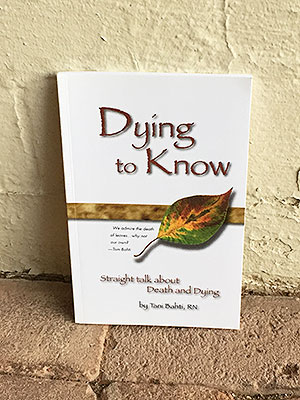The following represents excerpts from the book, Dying to Know by Tani Bahti and my view and comments on the particular issue. The issue of death is difficult for some people to address and plan for, but in Estate Planning, it is a necessity. We must accept the fact that death is a certainty. It is the only certainty in our lives. As a result, shouldn’t we understand its implications and choices when this time approaches us individually?
 Tani Bahti, RN, has spent much of her career in hospice care. For those of you who are unaware, hospice care is usually physician recommended for patients with 6 months, or less, to live. Tani, in her book, reveals how much misinformation and lack of information can negatively affect the dying process.
Tani Bahti, RN, has spent much of her career in hospice care. For those of you who are unaware, hospice care is usually physician recommended for patients with 6 months, or less, to live. Tani, in her book, reveals how much misinformation and lack of information can negatively affect the dying process.
As an Estate Planning attorney, I have helped plan estates for dying clients. As a result, I wrote a checklist for terminally ill clients and their families to insure issues, mostly financial, are addressed to avoid costly proceedings and beneficiary failures. It is called the Estate Checklist for Catastrophic Illness for End-of-Life Planning: A Family’s Guide for Urgent Estate Planning.
In the next few online newsletters, I intend to explore the dying process and provide information that may be surprising to many of you. Much of the information will be quotes from the book I have previously mentioned and another titled Final Gifts by hospice nurses, Maggie Callanan and Patricia Kelly, which features pre-death visions.
Dying is a natural process and your body possesses incredible wisdom to “take care of you during this time of life.” Just like the stages of birth, your body must go through certain stages while it shuts down toward death.
If we interfere with this natural process, it can create more discomfort. When dying, it is important to listen to your body (Dying to Know, page 17).
When you begin to understand what is happening and how to manage the changes, you will feel less fearful and more empowered.
The Energy Issue
“Where is my energy going,” a dying loved one might inquire? Everything a dying person does requires energy, which is diminishing. As a result, priorities must be established. Do they wish to spend time talking with family or friends; spending some time outside in the fresh air; watching television; writing memoirs; etc.? Energy must be allocated taking into consideration the dying loved one’s desires, not what is considered best for them by family members.
Because there is a natural decline in energy, this impacts the activity level. Family members should not feel rejected when the terminal loved one restricts, or even denies, opportunities to sit and visit with them.
As the energy lapses, the patient begins to sleep more often. Usually this indicates the patient is comfortable with the body shutting down. This is true whether the patient is on pain medication or not. Besides diminishing energy, there are changes occurring in the metabolism which causes increased sleeping – “low oxygen, high calcium, a liver or kidney shutdown, or many other causes that are part of the normal shutdown process” (Dying to Know, page 24).
If the loved one is resting comfortably and on pain medication, the presumption should be that the pain medication is the correct amount. When family members see the loved one sleeping more and more, many attempt to have dosages of pain medication to be changed, feeling that this will be a help to the patient. Many times, changing such dosage can cause discomfort to the loved one. Family members also need to understand and accept the fact that the body is shutting down naturally which is a positive occurrence for the loved one. Advice to the family members as written by John Lennon, “Let It Be.”
Even when the loved one has lost the energy to respond to you anymore, it has been discovered that they benefit from your presence and voice. “Studies indicate that hearing is the last sense to go” (Dying to Know, page 25). As a result, it is recommended that you continue to talk to your loved one in loving conversation and favorite family stories.
In our next segment on Natural Death we will discuss the issues of nutrition and hydration.
Blessings,
Jack
